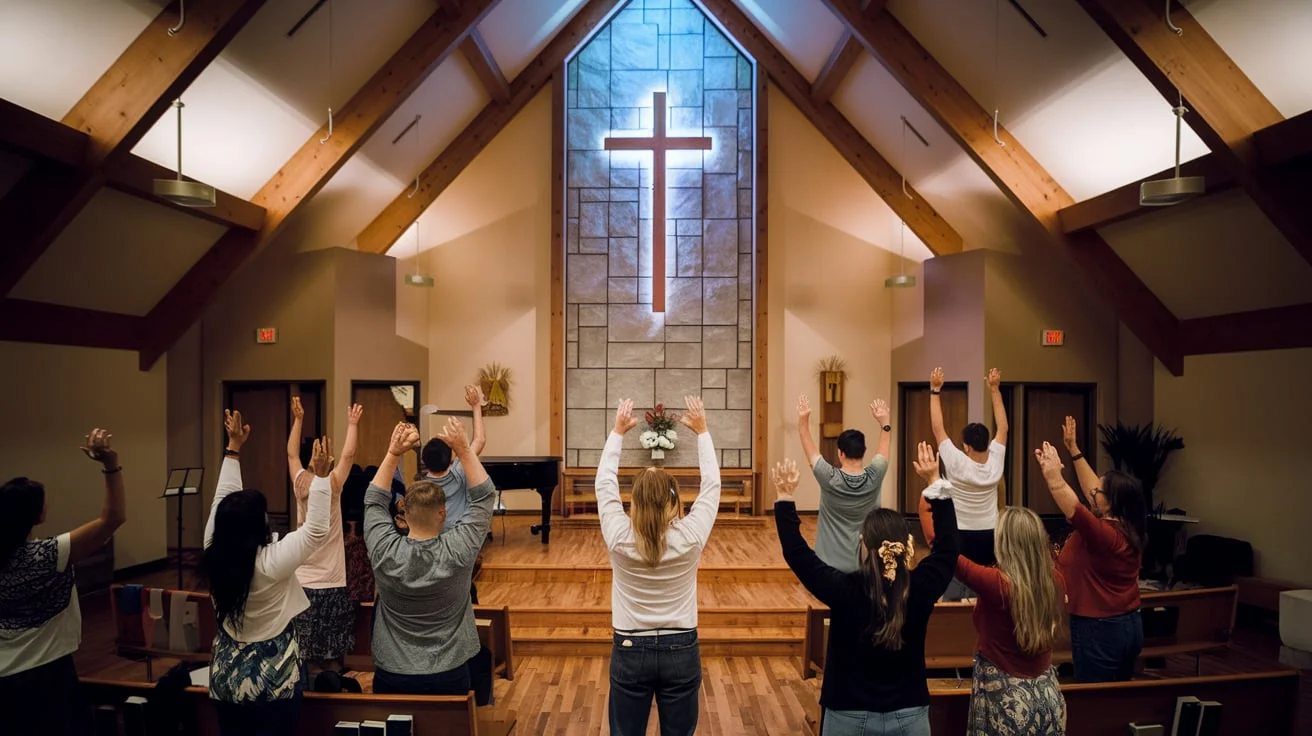Last Updated on September 24, 2024 by Muhammad Ramzan
Worship in the Bible is more than a ritualistic act; it’s a profound expression of devotion and reverence toward God.
This article delves into the multifaceted nature of worship as presented in the Scriptures, highlighting its evolution from ancient times to modern interpretations.
An Act of Surrender
Worship, at its core, is an act of surrender. In the Bible, this concept is vividly illustrated through various figures who demonstrated complete devotion to God.
Biblical Examples of Surrender
- Abraham: His willingness to sacrifice Isaac (Genesis 22) epitomizes ultimate surrender. Abraham’s faith and obedience underscore the essence of worship as a complete yielding to God’s will.
- Job: Despite severe trials and losses, Job’s response in Job 1:21—”The Lord gave, and the Lord has taken away; blessed be the name of the Lord”—reflects his unwavering trust and submission to God.
These examples highlight that worship involves more than rituals; it’s a heartfelt surrender to divine authority.
The Definition of Worship in the Bible
Understanding worship requires a look at how it is defined in both the Old and New Testaments.
Old Testament Definitions
- Hebrew Terms:
- Shachah (שָׁחָה): This term means “to bow down” or “prostrate oneself,” indicating a physical expression of reverence (e.g., Genesis 24:26).
- Abad (עָבַד): Translated as “to serve,” it emphasizes worship as a form of service and devotion (e.g., Exodus 3:12).
New Testament Definitions
- Greek Terms:
- Proskuneo (προσκυνέω): Meaning “to bow down” or “worship,” it reflects the act of showing deep respect (e.g., Matthew 2:11).
- Latreia (λατρεία): Refers to “service” or “worship,” emphasizing the aspect of serving God (e.g., Romans 12:1).
Worship in the Bible involves both adoration and practical service, demonstrating its holistic nature.
All of Life is Worship
Worship transcends the confines of ritual and becomes a way of life.
Biblical Basis
- Romans 12:1: “I urge you, brothers and sisters, in view of God’s mercy, to offer your bodies as a living sacrifice, holy and pleasing to God—this is your true and proper worship.”
- Colossians 3:17: “And whatever you do, whether in word or deed, do it all in the name of the Lord Jesus, giving thanks to God the Father through him.”
These passages illustrate that worship encompasses every aspect of life, transforming daily actions into acts of devotion.
The Concept of Whole-Life Worship
Living out worship involves integrating faith into all areas of life, including:
- Work: Performing duties with integrity and excellence.
- Relationships: Demonstrating love and respect.
- Personal Conduct: Exhibiting values and character aligned with biblical teachings.
Worship Before the Time of Moses
Before the establishment of formal worship practices, early figures in the Bible practiced worship in various forms.
Pre-Mosaic Worship Practices
- Noah: After the flood, Noah built an altar and offered sacrifices to God (Genesis 8:20).
- Abraham: He constructed altars and invoked God’s blessings at different locations (Genesis 12:7, 13:18).
Historical and Cultural Context
Early Hebrew worship was influenced by surrounding cultures but was distinct in its focus on monotheism and covenantal relationship with God. This foundational worship set the stage for more structured practices.
Moses and the Tabernacle
The Tabernacle represented a pivotal development in Israelite worship, providing a central place for communal and sacrificial worship.
The Role of the Tabernacle
- Structure and Significance: The Tabernacle, a portable sanctuary, included the Holy of Holies, the altar, and the laver. It symbolized God’s dwelling among His people.
- Rituals and Sacrifices: Detailed instructions for sacrifices and rituals were given in Exodus and Leviticus, reflecting the importance of atonement and purification.
Transition to the Temple
The Tabernacle’s significance continued until the construction of Solomon’s Temple, which became the permanent place of worship in Jerusalem. The transition marked the evolution from a movable sanctuary to a fixed, grand structure.
Three Kinds of Worship
Worship manifests in various forms, each with its unique significance.
Public Worship
- Communal Gatherings: Festivals, feasts, and synagogue services foster collective worship and teaching (e.g., the Passover, Sabbath observance).
- Biblical Examples: The Feast of Tabernacles (Leviticus 23:34) and the dedication of the Temple (1 Kings 8).
Private Worship
- Personal Devotion: Includes individual prayer, meditation, and Bible study.
- Biblical Examples: Daniel’s regular prayers (Daniel 6:10) and Jesus’ solitary prayers (Mark 1:35).
Spontaneous Worship
- Responsive Worship: Occurs in response to specific events or divine interventions.
- Biblical Examples: The Israelites’ songs of praise after crossing the Red Sea (Exodus 15) and Paul and Silas singing in prison (Acts 16:25).
Worship as Response to God
Worship is often a natural reaction to God’s actions and revelations.
Responding to God’s Revelation
- Biblical Instances: Worship frequently follows divine interventions. For example, the Israelites’ worship after the Exodus highlights a response to God’s deliverance.
- Case Study: The feeding of the 5,000 (John 6:11-14), where the crowd recognized Jesus as a prophet and responded with awe.
The Role of Music in Worship
Music has always played a significant role in worship, enhancing the expression of devotion.
Historical Role of Music
- Old Testament: The use of psalms, instrumental music, and singing (e.g., Psalm 150).
- New Testament: Encouragement to sing hymns, psalms, and spiritual songs (Colossians 3:16).
Types of Biblical Music
- Psalms: Songs of praise and lament (e.g., Psalms 23, 51).
- Hymns: Early Christian hymns that articulated theological truths.
- Spiritual Songs: Informal songs of personal worship and encouragement.
Theological Implications
Music serves as a means to express theological truths, encourage community, and deepen personal devotion. It aids in memorizing Scripture and reinforcing the message of worship.
The Importance of Exclusive Worship
Exclusive worship underscores the commandment to worship God alone, rejecting idolatry and false gods.
The Call for Monotheism
- First Commandment: “You shall have no other gods before me” (Exodus 20:3). This foundational commandment emphasizes exclusive devotion to God.
Historical Context of Idolatry
- Biblical Examples: Instances of idolatry, such as the golden calf (Exodus 32), reveal the consequences of deviating from exclusive worship.
- Consequences: The impact of idolatry on Israel’s relationship with God and its repercussions in biblical history.
Modern Application
- Relevance Today: The call for exclusive worship remains relevant in contemporary faith practices. It involves rejecting modern forms of idolatry, such as materialism and self-worship.
Conclusion
Understanding worship in the Bible provides deep insights into its transformative nature. From ancient practices to contemporary expressions, worship remains a fundamental aspect of a believer’s life. Embracing the biblical understanding of worship helps to align our lives with God’s will and fosters a deeper, more authentic relationship with Him.

James Wilson is a renowned biblical scholar and dream expert, dedicated to exploring the spiritual dimensions of dreams. His in-depth knowledge and compassionate approach provide readers with valuable tools to understand and embrace the divine messages revealed in their dreams.










